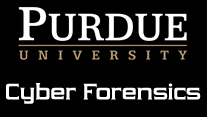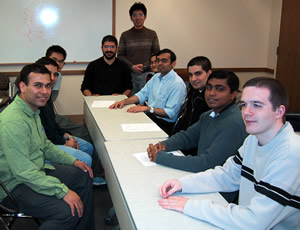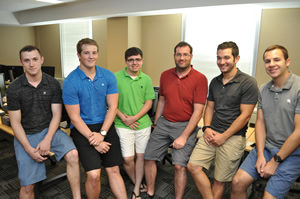The Center for Education and Research in Information Assurance and Security (CERIAS)
The Center for Education and Research inInformation Assurance and Security (CERIAS)
Autonomous & Intelligent Multi-agent Systems (AIMS) Lab aims to investigate autonomy and intelligence for networked systems consisting of multiple unmanned mobile agents, through combination of theories in control, networks, optimizations and artificial intelligence. We are interested in both theoretical research towards novel control algorithms for coordination among a large-network of mobile agents and experimental implementations for improving autonomy and intelligence of the overall networked system.

CEIP’s mission is to advance the security of the nation’s critical cyber infrastructures through research, education and outreach.
Our society is crucially dependent on several interdependent critical infrastructure systems and processes for operating these systems. These are subjected to various kinds of hazards and faults, both natural and malicious, often leading to user-visible failures. Our center provides the scientific method to analyze the failure modes of the infrastructures and provide engineering tools to systematically build in resilience. Initial focus areas are cyberinfrastructure, cyber physical systems, and large-scale built structures. We will develop techniques that apply broadly across multiple domains to complement existing domain-specific techniques from the specialists.

The Center for Science of Information’s mission is to advance science and technology through a new quantitative understanding of the representation, communication, and processing of information in biological, physical, social, and engineered systems.
Semiconductor technology advancements have driven great progress in computing, communication, information and data processing, as well as energy generation and distribution. It is evident that this technology has made a profound impact on almost every aspect of our life. It is one of the essential industries for our global economy and security. Ensuring this ecosystem to be secure is therefore critical to the well-being of the global community.
In a global market the Center for Secure Microelectronics Ecosystem (CSME) will foster the collaboration between industry, academia and the U.S. government with the aim to ensure a secure supply of materials, semiconductor chips and related tools all the way from the foundry to the packaged system assuming a zero-trusted model.
Purdue’s Cloud-native, Cyberinfrastructure and Networks Laboratory (CYAN Lab) investigates a broad range of research problems in network systems, including software-defined and programmable networks, network virtualization, and cloud-native infrastructure. The CYAN Lab focuses on fundamental and applied research in computer networks and cloud-native infrastructure. Our experimental design, implementation, and evaluation of networked systems enable the developing of novel applications and communication ecosystems.

The faculty and students of the Purdue Cyber Forensics Lab, housed in the Department of Industrial Technology, work closely with federal and state law enforcement officials to develop and deliver the training needed to combat cybercrime. FBI estimates put cybercrime costs to businesses and the government at more than $10 billion a year—to which identity theft adds another $1 billion in cost annually. Lab work is also dedicated to developing better investigative methods for cybercrime (e.g., cyberterrorism/espionage, bank and business fraud, and identity theft) and national standards for computer forensic education and certification. The goal is to increase the number of trained officers and educators and to ensure that the evidence found is admissible in court. External partners include the National Institute of Justice, the National White Collar Crime Center, and the Indiana State Police.

We are interested in the question of how to build heterogeneous large-scale distributed systems that are reliable, in the face of different classes of failures. Since many business and life critical functions are being performed by distributed systems, they need to be reliable while meeting their performance goals. Thus, there is need for smart error detection, diagnosis and recovery protocols. More importantly, there is need for architectures that can combine fault tolerance aspects with performance aspects in an adaptive manner, adapting to different user requirements and different runtime environments. We consider intrusions to be an increasingly important class of faults and are therefore looking at the design of intrusion tolerant systems. For concrete application context for our work, we use wireless ad hoc networks, Voice over IP systems, and distributed e-commerce systems.
Our lab seeks to enable advancements in discovery in cybersecurity and other disciplines
Embedded Systems lab’s research focuses on the architecture and design of embedded computing and communication systems, and their underlying hardware and software technologies.
The research in this group has been strongly motivated by difficult and interesting practical problems such as controlling multiple-vehicle systems. Controlling multiple-vehicle systems is one of the most important and challenging aspects of modern system theory and practice.
Freedom Research Lab performs people-centric privacy and security research using cryptography, distributed computing, and data analysis. We design, implement, and analyze systems for enhancing privacy, transparency and accountability over the Internet. Our current research projects majorly focuses on cryptocurrencies & blockchain technology, anonymity networks, accountable communication, and secure deletions of archived data.
Responsible adoption of artificial intelligence (AI) throughout society is one of the foremost challenges of the 21st century. In response, the Governance and Responsible AI Lab (GRAIL) is especially attuned to the possibilities and challenges of governing in the AI era.
The Purdue Computer and Information Technology High Performance Computer and Cyberinfrastructure Laboratory (HPC-CRL) is a focal point for education, research, and collaboration in the development, deployment, and use of supercomputing, grid computing, and cyberinfrastructure.
Indiana and the Midwest are well-positioned to become leaders in the field of connected and autonomous vehicle (CAV) transportation. Purdue’s facilities and competencies mirror those needed to fill the gap for CAV transportation in the region. Purdue is in a position to lead with potential partners in Indiana and the nation in the development of autonomous vehicle research, testing, evaluation and implementation. Discovery Park will oversee this initiative by forming strategic partnerships and will provide integrated, world-class engineering, data science, policy, economic and social science problem solving capabilities and solutions.
Purdue University is building a world-leading program in artificial intelligence (AI). Leveraging Purdue’s signature strengths in materials science, engineering, microelectronics, computer science, agriculture and life sciences, the Institute for Physical AI (IPAI) is committed to solving the world’s toughest challenges.
INtegrated Smart Energy Technology lab (INSET)- provides a shared space that supports the understanding and learning of the electrical Smart Grid - a system that interconnects the electricity distribution grid with two-way communications to provide energy monitoring and management for the power industry and consumers.
Integrated Systems Laboratory’s mission is to pursue innovations that enable the design and use of future VLSI Systems-on-chip. We are developing Architectures, System-level Design Methodology, and Software Programming Frameworks to address challenges and opportunities posed by the applications of the future (such as Recognition, Mining and Synthesis), architectural trends (such as massive chip-scale parallelism), and extreme device scaling (such as process variations and reliability).
Our vision is to be at the forefront of advancing data science-enabled research and education by tightly coupling theory, discovery, and applications while providing students with an integrated, data science-fluent campus ecosystem.

The mission of the International Center for Biometrics Research is to excel in the applied research of biometric technologies with a continued commitment to education and innovative research, as well as engaging academia, government and industry in all activities. We strive to achieve our mission through a partnership between industry and academia, bridging cultures to find solutions to the challenges associated with developing and implementing biometric technologies.
We are designing and implementing systems targeted at the wide-area Internet placing a central emphasis on working prototypes, empirical methods, and data-driven analysis. Our current research focuses on Cloud Computing, and Enterprise Network Configuration Management. We are interested in challenges around building verifiable enterprise networks that can correctly achieve desired security and other policy requirements, and on assurable migration of enterprises to the cloud. In the past, we have conducted research in the areas of Peer to Peer Systems (including security challenges associated with the systems), and Internet video Content Distribution architectures. Our research has benefited by support from NSF, Cisco, AT&T, and Microsoft. Many of the challenges we address are motivated by real-world experience, require insights into operations of distributed systems at Internet scales, are great fun, and can change the world!
The current efforts at the Lab For Research In Emerging Network and Distributed Systems (FRIENDS) focus on the development of virtualization technologies for malware investigation and defense and for virtual distributed computing. The lab has developed Collapsar, one of the first VM-based honeyfarm architectures for network attack capture and detention. A safe, high-fidelity emulation environment called vGround has also been developed for conducting destruction-oriented malware experiments. More recently, the lab has been investigating VMM-level solutions to the detection, prevention, and forensics of highly stealthy malware such as rootkits and bots.
Network security consists of the provisions and policies adopted by a network administrator to prevent and monitor unauthorized access, misuse, modification, or denial of a computer network and network-accessible resources. Network security involves the authorization of access to data in a network, which is controlled by the network administrator. The Network Administration & Security Lab offers students an environment where they are able to explore as well as develop the skills and knowledge in order to create new technologies, new innovations in order to increase efficiency and safety for individuals.
A proper design can offer many benefits like security, accessibility, usability, speed, redundancy and scalability. The Network Infrastructure Design & Deployment Lab provides students with an environment where they are able to explore as well as develop the skills and knowledge in order to create new processes, new innovations in order to increase efficiency and performance.
The NIPA Capstone Lab provides students with an environment where they can explore as well as develop the skills and knowledge in order to create new technology, new innovations to improve the lives of individuals.
The Open Ag Technology and Systems Group is devoted to bringing great open source projects to agriculture. We are farmers, professors, students, scientists, and engineers. We love to code, solder, do math, analyze data, and have fun doing it.
The general purpose of the PRISM Program is the investigation, development, and experimentation of how to apply computer intelligence and information technologies to most effectively improve the performance and quality of industrial systems. PGRN (Purdue Global Research Network) integrates collaborative projects with affiliated PRISM labs and centers in four continents.
Purdue’s Product Lifecycle Management Lab is an interdisciplinary research center. The Center fuses the talents and resources from the Purdue Polytechnic Institute, Engineering, Science, and Krannert School of Management into a single focused entity to serve as a resource for industry. Through the study, training, and implementation of product lifecycle management (PLM), the Center draws on expertise from all areas of the Purdue community to provide the Center’s partners in business and industry with knowledge and tools.
The mission of the Institute is threefold: fulfill educational and training needs of the Homeland Security professionals; accelerate the discovery, validation, and implementation of new knowledge and tools for sustainable homeland security; and engage with key stakeholders in meeting the challenges associated with homeland security. The Institute is organized into seven signature areas that include food and plant security as well as economic security.
PPRI is a research community led by faculty but including also staff, post-doctoral students, graduate and undergraduate students.
The goal of Purdue Systems and Software Security Lab (PurS3) is to secure modern systems by providing principled yet practical solutions to various security problems.

The PurSec Lab at Purdue University is a group of researchers focusing on System Security Research. We are actively looking for interns, PhD students, and Postdocs working in the area of System Security.

The Regenstrief Center for Healthcare Engineering at Purdue University is improving the efficiency, quality and accessibility of healthcare by tapping into expertise in engineering, science, management and social sciences. Launched in 2005 with a gift from the Regenstrief Foundation, the center is the only integrated university-wide effort in healthcare engineering in the nation.
The Smart Machine & Assistive Robotics Technology (SMART) Laboratory at Purdue University explores human-robot interaction, multi-robot systems, and robotic sensor networks with emphasis in field and service robotics and assistive technology and robotics. The goal of the SMART Lab is to discover and apply robotics technology to the point where it can be more widely applied everywhere and for everyone. This includes in developing countries, rural areas, dangerous situations, and for the elderly and people with disabilities. Visit the Lab’s website (www.smart-laboratory.org) for more information.
SOL4CE (Scalable Open Laboratory for Cyber Experimentation) is a resource facility, available to faculty and students across the Purdue University system, for quick modeling and simulation of cyber and cyber-physical systems. The laboratory facilitates extended experimentation of evolving systems and architectures for security, resiliency, privacy, autonomy and machine learning development and application.
Problems of increasing complexity are facing decision-makers within today’s government and industry, and the moniker of “system-of-systems” is increasingly being applied to many of these challenges. With multiple, evolving, heterogeneous, distributed systems involved and embedded in networks at multiple levels, a guiding methodological framework is needed to enable adequate decision-support. A holistic framework is sought to enable decision makers to discern whether related infrastructure, operational, policy, economic, and/or technology considerations together will be effective, ineffective, or indifferent over time. The need to address these problems as systems-of-systems is urgent and critical, because they involve decisions that commit large amounts of money and resources, for which ultimate failure or success carries heavy consequences for society now and for many future generations.

VACCINE’s goal is to help this nation’s 2.3 million extended homeland security personnel, including first-responders, perform their jobs more effectively by turning mass amounts of data into manageable information.
Turning massive data into actionable knowledge through innovative visual analytic techniques is vital to the mission of the Command, Control, and Interoperability (CCI) Division of The Department of Homeland Security, as well as all of the mission areas of DHS.
Video and Imaging Processing Laboratory (VIPER) is equipped with state-of-the-art technology to digitize, store, process, stream, and display digital video and images. This technology supports research in areas such as the developing of new video compression techniques, new streaming technologies, and creating multimedia material for use in video indexing, storage, and retrieval. In the security arena, the lab examines digital watermarking techniques. Lab faculty also explore object forensics, including printer forensics, which has applications for both anti-counterfeiting efforts and intellectual property disputes.
Broadband is today’s communications gold standard. Virtually everybody wants it, but reaching users with secure, reliable, cost-effective broadband service remains an enormous challenge. The design, installation, integration, maintenance and extension of complex broadband networks have been both costly and time-consuming. Wireless broadband systems have become a part of our everyday lives and can meet a number of these challenges often not available via wired services. These systems can make delivery of high-demand technologies like broadband Internet access, voice over IP, video services, security surveillance and E1/T1 capabilities both faster and significantly less expensive. However, few people understand the complexities of the wireless networks needed to deliver the needed bandwidth to the end user. In the Wireless Network Applied Research Lab, through hands-on lab experiences and experimentation, students learn how to evaluate technical performance criteria, make comparisons among different systems, and match systems and equipment to the unique application needs of an organization’s users. The availability of many different wireless systems also offers additional opportunities for faculty and graduate-level research in wireless system design and applications.